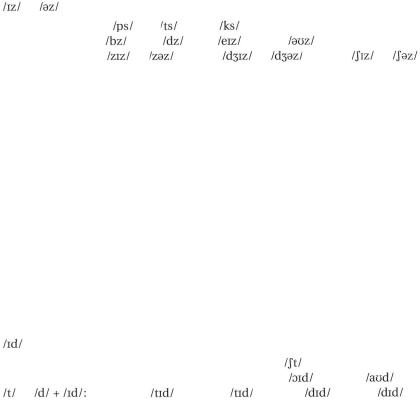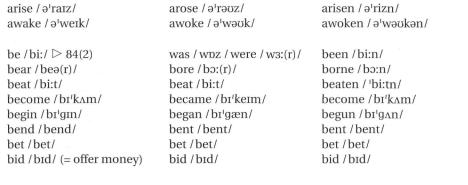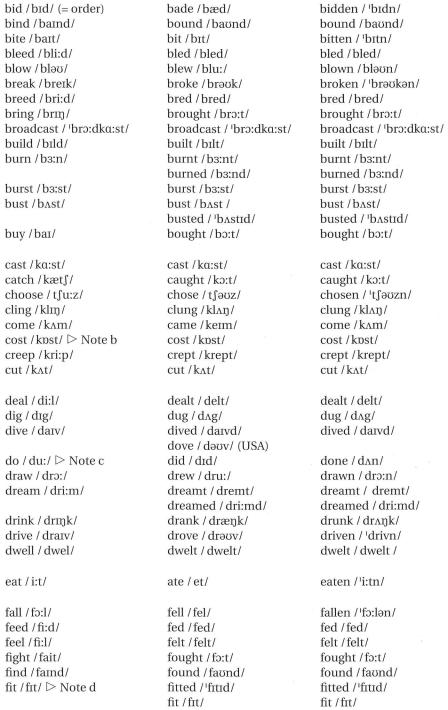36 WORD-BUILDING |
PAGE 374 |
2 There are different kinds of nationality words.
a Many end in an: Italian, American, Mexican. We can add s to form a plural noun.
Three Italians are doing the course.
(The) Americans think they can see Europe in a week.
NOTE
aTo this group also belong Greek, Czech, Thai, Arab and words ending in i, e.g. Pakistani, Israeli.
The Greeks invented democracy.
bThe language of the Arabs is Arabic.
b Some end in ese: Chinese, Portuguese. We cannot add s. Several Chinese (people) were waiting in the queue.
When we talk about a whole people, we must use the or people.
The Chinese welcome/Chinesepeople welcome western tourists.
NOTE Swiss (= from Switzerland) also belongs in this group.
c With some words, the adjective is different from the noun.
She's Danish./She's a Dane.
I like Danish people./I like (the) Danes.
Also: Swedish/a Swede, Finnish/a Finn, Polish/a Pole, Spanish/a Spaniard, Turkish/a Turk, Jewish/a Jew.
NOTE
From Britain we form the adjective British.
There are a lot ofBritish people in this part ofSpain.
The nouns Brit and Briton are not very usual in spoken British English.
There are a lot ofBrits/Britons in this part ofSpain.
This usage is rather journalistic. Brit is informal. The Americans say Britisher.
For the whole people we say the British.
The British prefer houses to flats.
d With some words, the noun has the suffix man He'sEnglish./He's an Englishman. Englishmenarereserved.
He'sEnglish./He's an Englishman. Englishmenarereserved.
Also: Welsh/a Welshman, Irish/an Irishman, French/a Frenchman, Dutch/a Dutchman.
For a whole people, we can use the adjective with the or people.
TheEnglishare/Englishpeopleare reserved.
NOTE
aIt is less usual to use woman as a suffix, but we can use an adjective + woman. The English woman works at the university.
bWhen we talk about people from Scotland, we can use the adjective Scottish or the nouns
Scot and Scotsman.
He's Scottish./He's a Scot/He's a Scotsman.
How do you like Scottish people/Scots?
We use Scotch mainly in fixed expressions such as Scotch whisky.
PAGE 376
37
Word endings: pronunciation and spelling
289 Summary
Some words have grammatical endings. A noun can have a plural or possessive form: friends, friend's. A verb can have an s-form, ed-form or ing-form: asks, asked, asking. Some adjectives can have a comparative and superlative form: quicker, quickest. A word can also end with a suffix: argument, idealist, weekly, drinkable.
When we add these endings to a word, there are sometimes changes in pronunciation or spelling.
The s/es ending • 290
match matches 
The ed ending •291
wait waited 
Leaving out e • 292
make making insure insurance
The doubling of consonants • 293
big bigger regret regrettable
Consonant + y • 294
easy easily beauty beautiful
290 The s/es ending
To form a regular noun plural or the s-form of a verb, we usually add s.
rooms |
games |
looks |
opens |
hides |
After a sibilant sound we add es. |
|
|
kisses |
watches |
bushes |
taxes |
|
But if the word ends in e, we add s. |
|

PAGE 377 |
|
|
|
|
292 Leaving out e |
|
|
|
|
|
2 A few nouns ending in o add es. |
|
|
|
|
|
potatoes |
tomatoes |
heroes |
echoes |
|
|
|
|
But most add s. |
|
|
|
|
|
|
radios |
stereos |
pianos |
photos |
studios |
discos |
kilos |
zoos |
3 The ending is pronounced /s/ after a voiceless sound, /z/ after a voiced sound and
or |
after a sibilant. |
|
|
|
|
Voiceless: |
hopes |
, fits |
,clocks |
|
|
|
Voiced: |
cabs |
, rides |
, days |
, throws |
|
|
Sibilant: |
loses |
or |
, bridges |
or |
, washes |
or |
4 The possessive form of a noun is pronounced in the same way.
Mick's  theteacher's
theteacher's  MrsPrice's
MrsPrice's  or
or 
But we do not write es for the possessive, even after a sibilant.
MrJones's the boss's
291 |
The ed ending |
|
|
|
|
|
1 The ed-form of most regular verbs is simply verb + ed. |
|
|
played |
walked |
seemed |
offered |
filled |
|
|
If the word ends in e, we add d. |
|
|
|
|
moved |
continued |
|
pleased |
smiled |
|
|
NOTE |
|
|
|
|
|
|
|
For the doubling of consonants before ed, • 293. |
|
|
|
For y before ed, • 294. |
|
|
|
|
|
2 |
The ending is pronounced /t/ after a voiceless sound, /d/ after a voiced sound and |
|
after /t/ or /d/. |
|
|
|
|
|
|
Voiceless: |
jumped /pt/, baked /kt/, |
wished |
, allowed |
|
Voiced: |
robbed /bd/, closed /zd/, enjoyed |
|
or |
waited |
,expected |
, handed |
, guided |
292 Leaving out e
1 We normally leave out e when it comes before an ing-form. make making shine shining use using
But we keep a double e before ing. see seeing agree agreeing
2 When e comes before ed, er or est, we do not write a double e. type typed late later fine finest
3 We usually leave out e before other endings that start with a vowel, e.g. able, ize, al.
love |
lovable |
private |
privatize |
culture |
cultural |
NOTE |
|
|
|
|
|
But when a word ends in ce /s/ or ge , we keep the e before a or o. enforce enforceable courage courageous
, we keep the e before a or o. enforce enforceable courage courageous
We can also keep the e in some other words: saleable/salable, likeable/likable, mileage/milage.
37 WORD ENDINGS PAGE 378
4 We keep e before a consonant. |
|
|
hate hates |
nice |
nicely |
care |
careful |
NOTE |
|
|
|
|
Exceptions are words ending in ue: argue |
argument, true truly, due duly. |
Also: whole |
wholly, judge |
judgment/judgement. |
5 To form an adverb from an adjective ending in a consonant + le, we change e to y. simple simply possible possibly
To form an adverb from an adjective in ic, we add ally.
dramatic |
dramatically |
idiotic |
idiotically |
NOTE An exception is publicly. |
|
|
293 The doubling of consonants
1 Doubling happens in a one-syllable word that ends with one written vowel and one written consonant, such as win, put, sad, plan. We double the consonant before a vowel.
|
|
|
|
|
|
|
|
|
win |
winner |
put |
putting |
sad |
saddest |
plan |
planned |
NOTE |
|
|
|
|
|
|
|
a |
Compare top |
tapping and tope |
|
taping. |
|
|
b |
The consonant also doubles before y: fog |
foggy. |
|
|
|
2 We do not double y, w or x.
stay staying |
slow |
slower fix fixed |
We do not double when there are two consonants.
And we do not double after two written vowels.
keep keeping |
broad |
broader |
3The rule about doubling is also true for words of more than one syllable, but only if the last syllable is stressed.
for'get |
forgetting |
prefer |
preferred |
We do not usually double a consonant in an unstressed syllable.
'open 'opening 'enter 'entered
NOTE
In British English there is some doubling in an unstressed syllable. We usually double l.
travel |
travelling |
tunnel |
tunnelled |
marvel |
marvellous |
jewel |
jeweller |
|
|
|
|
We also double p in some verbs. |
|
|
|
handicap |
handicapped |
worship |
worshipping |
|
But in the USA there is usually a single l or p in an unstressed syllable, e.g. traveling, worshiping.
4 When a word ends in ll and we add ly, we do not write a third l.
PAGE 379 294 Consonant + y
294 Consonant + y
When a word ends in a consonant + y, the y changes to ie before s.
study |
studies |
lorry |
lorries |
|
|
Before most other endings, the y changes to i. |
|
study |
studied |
silly |
sillier |
lucky |
luckily |
happy |
happiness |
|
|
|
We do not change y after a vowel.
day |
days |
buy buyer |
stay |
stayed |
|
|
But pay, lay and say have irregular ed-forms: paid |
, laid |
, said |
Also |
day |
daily. |
|
|
|
|
NOTE
a The possessive forms are singular noun + apostrophe + s, and plural noun + apostrophe. the lady's name the ladies' names
b A one-syllable word usually keeps ybeforely:shyly,slyly, dryly/drily.
c We do not change y when it is part of a person's name: Mr and Mrs Grundy the Grundys.
d We do not changeyin by: stand-bys, lay-bys.
2 We keep y before i.
copy |
copying |
|
hurry |
hurrying |
NOTE |
|
|
|
|
We change ie to ybefore ing. |
|
die |
dying |
lie |
lying |
|

PAGE 380
38
Irregular noun plurals
295 Summary
Most countable nouns have a regular plural in s or es. hands dates buses.
For details of spelling and pronunciation, • 290.
But some nouns have an irregular plural. Here are some examples.
Vowel and consonant changes • 296
man men wife wives
Nouns which do not change in the plural • 297
one/two aircraft one/two sheep
Irregular plural endings. • 298
children criteria stimuli
296 Vowel and consonant changes
1 Some plurals are formed by changing the vowel sound.
foot |
feet |
goose |
geese |
man |
men |
|
tooth |
teeth |
mouse |
mice |
|
woman |
women |
NOTE
aWe also use men and women in words like Frenchmen, sportswomen.
bThe plural people is more usual and less formal than persons.
Several people were waiting for the lift.
A maximum ofsix persons may occupy this lift.
A people is a large group such as a nation.
The Celts were a tall, fair-skinned people.
One day the peoples of this world will live in peace.
2 With some nouns we change f to v and add es/s. |
|
loaf |
loaves |
thief |
thieves |
life |
lives |
Also: calves, halves, knives, leaves, shelves, wives, wolves
NOTE
Some other nouns in f/fe are regular: chiefs, beliefs, cliffs, roofs, safes. A few have alternative forms, e.g. scarfs /scarves.

PAGE 381 |
298 Irregular plural endings |
3Some nouns have a regular written plural in ths, but the pronunciation of th changes.
path  paths
paths
Also: mouths, youths (= young people)
NOTE
Some other nouns in th are regular: months, births, deaths . Some have alternative forms, e.g. truths
. Some have alternative forms, e.g. truths  or
or 
4The plural of house is houses 
5The usual plural of penny is pence, e.g. fifty pence. Pennies are individual penny coins.
297 Nouns which do not change in the plural
Some nouns have the same form in the singular and plural.
Singular: One aircraft was shot down.
Plural: Two aircraft were shot down.
These nouns are aircraft, hovercraft, spacecraft etc; some animals, e.g. sheep, deer, some kinds offish, e.g. cod, salmon; and some nouns ending in s, e.g. headquarters, means. • 154(3)
NOTE
aSome measurements (e.g. pound, foot) can be singular after a plural number, e.g. two pound/poundsfifty.
bFor six hundred and twenty, • 191(1) Note c.
298 |
Irregular plural endings |
|
|
|
1 |
en |
|
|
|
|
|
|
child |
children |
ox |
oxen |
|
|
2 |
a |
|
|
|
|
|
|
criterion |
criteria |
phenomenon |
phenomena |
medium |
media |
|
curriculum |
curricula |
|
|
|
|
NOTE Some nouns in on and um are regular, e.g. electrons, museums.
3 |
i |
|
|
|
|
stimulus |
stimuli |
cactus |
cacti /cactuses |
|
nucleus |
nuclei / |
nucleuses |
|
NOTE Some nouns in usare regular: choruses, bonuses.
4 |
ae |
|
|
formula |
formulae / formulas |
5 |
es |
|
analysis |
analyses |
crisis |
crises |
hypothesis |
hypotheses |
PAGE 382
39
Irregular verb forms
299 Summary
A regular verb takes the endings s, ed and ing. For example, base form look, s-form looks, past tense looked, ing-form looking and past/passive participle looked. For more details, • 58.
List of irregular verbs • 300
Some verbs have ah irregular past tense and participle.
Base form: |
Did you write the letter? |
Past tense: |
I wrote the letter yesterday. |
Past participle: |
I've written the letter. |
We also use the irregular forms after a prefix such as re, un, out, mis.
I've rewritten the letter. He undid the knot.
Special participle forms • 301
Some special participle forms come before a noun. a drunken riot
300 List of irregular verbs
Base form |
Past tense |
Past/passive participle |

 He'sEnglish./He's an Englishman. Englishmenarereserved.
He'sEnglish./He's an Englishman. Englishmenarereserved.








 theteacher's
theteacher's  MrsPrice's
MrsPrice's 

 , we keep the
, we keep the  paths
paths


